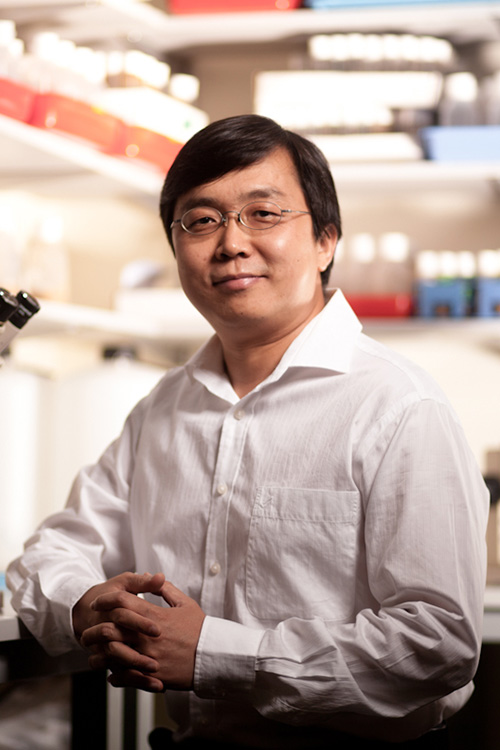
Impact
Approximately 50% of synapses are drastically eliminated in human brains during adolescence, a process known as neuronal pruning. This pruning process is implicated in human brain disorders, as impaired pruning can lead to neurological disorders like schizophrenia and autism. As such, the understanding of neuronal pruning can contribute to the development of potential therapeutic interventions for human neurological disorders.
Collaborations, Achievements & Honours
- Pioneer the first genome-wide screens in fruit flies and isolate genes and pathways required for neuronal pruning
- Identify many genes or pathways that play crucial roles in the initiation and execution of neuronal pruning in fruit flies
- Collaborate with NUS and KK Women’s and Children’s Hospital on human neurodevelopmental disorders
- Grant support by the National Research Foundation since 2017
- Winner of the National Young Scientist Award, Biomedical Category for breakthrough research on neural development and neurological disorders (2007)
- Publish many key findings in top tier journals like Nature Cell Biology, Nature Neuroscience, Neuron, Developmental Cell, PLOS Biology, PNAS and EMBO Journal
Research Areas
Neuronal Development, Neuronal Pruning, Neurodevelopmental Disorders, Neurodegenerative Diseases, Developmental Genetics
Affiliations
- Senior Principal Investigator, TLL
- Adjunct Associate Professor, Department of Biological Sciences, NUS
Question
How can we pave the way for new therapeutic strategies, targeted at human psychiatric disorders and neurodegenerative diseases? The genes and pathways isolated might serve as potential therapeutic targets. However, at this current stage, our work still belongs to a basic exploratory research.
Approach
The lab focuses on studying the mechanisms of neuronal pruning using the model organism Drosophila melanogaster, or the fruit fly. Fruit fly has been well established to study many evolutionarily conserved biological pathways (largely conserved in humans) due to the availability of numerous genetic tools and minimal genetic redundancy. Fruit flies undergo neuronal pruning in response to ecdysone steroid hormone during metamorphosis, which strikingly resembles the synapse elimination process in human brains during adolescence.
The lab has established ddaC sensory neuron as an attractive in vivo model to systematically unravel the molecular and cellular mechanisms of dendrite pruning, by using a combination of molecular, genetic, biochemical, bioimaging and proteomics approaches. They have identified over 30 novel pruning factors and important pathways that initiate and execute pruning in sensory neurons. Those pruning genes and pathways are highly conserved in humans, raising the possibility that the pruning machinery identified from fruit flies might be also utilized during neuronal pruning in human brains. The steroid hormone-mediated pathways and epigenetic regulators, such Sox14, Mical, Brahma and CBP-related orthologs in humans, might be important for the pruning and maturation of nervous systems during human adolescence.
Looking ahead, the lab has initiated new research programmes with local clinician scientists by establishing human brain organoid culture facility in TLL. They aim to apply the knowledge on neuronal pruning gathered from flies to brain cortex development in humans. It is conceivable that some pruning machineries are conserved during human brain development and remodelling. In this regard, Dr Yu’s research will pave the way for future studies of those pruning genes in the context of neurodevelopment and neuro-pruning, as well as neurological disorders in humans. His research will develop translatable knowledge that potentially leads to the treatment of human neurodevelopmental disorders.
Bio
Dr. Yu obtained his PhD degree at the Institute of Molecular and Cell Biology (IMCB), National University of Singapore in 2003. After that, he immediately established his independent research group in TLL, and was awarded the National Young Scientist Award for breakthrough research on neural development and neurological disorders in 2007. He is currently Senior Principal Investigator at TLL, and Adjunct Associate Professor in the Department of Biological Sciences. Dr. Yu was elected as the President of Society for Neuroscience Singapore. He is currently a Section Editor in the PLOS Genetics journal. Dr. Yu, as a senior author, has published his key findings in Nature Cell Biology, Nature Neuroscience, Neuron, Developmental Cell, PLOS Biology, EMBO Journal and PNAS.
Senior Principal Investigator
Yu Fengwei
The lab investigates the basic principles of neuronal pruning and development using both fruit flyand in vitro human cerebral organoid models
Group Publications
-
Interplay between autophagy and CncC regulates dendrite pruning in Drosophila
Jue Yu Kelly Tan*, Liang Yuh Chew*, Gábor Juhász, Fengwei Yu.28 February 2024 -
Polycomb group genes are required for neuronal pruning in Drosophila
Bu S#, Lau SSY#, Yong WL#, Zhang H#, Thiagarajan S, Bashirullah A, Yu F*.15 February 2023 -
Drosophila GSK3beta promotes microtubule disassembly and dendrite pruning in sensory neurons
Dzaki N#, Bu S#, Lau SSY, Yong WL, and Yu F*.20 October 2022 -
AMPK activates the Nrf2-Keap1 pathway to govern dendrite pruning via insulin pathway in Drosophila
Chew LY, He JZ, Wong JLJ, Li S, Yu F.*.30 July 2022 -
Drosophila CLASP regulates microtubule orientation and dendrite pruning by suppressing Par-1 kinase
Bu S, Tang Q, Wang Y, Lau SYS, Yong WL, Yu F*.2 June 2022 -
Protein phosphatase PP2A regulates microtubule orientation and dendrite pruning in Drosophila
Rui M, Ng KS, Tang Q, Bu S, Yu F.18 March 2020 -
A systematic analysis of microtubule-destabilizing factors during dendrite pruning in Drosophila
Bu S, Yong WL, Lim BJW, Kondo S, Yu F.*.15 August 2021 -
Nrf2-Keap1 pathway is activated by steroid hormone signaling to govern neuronal remodeling
Chew LY#, Zhang H#, He JZ, Yu F* (# Co-first authors).3 August 2021 -
Cannabinoids modulate food preference and consumption in Drosophila melanogaster
He J, Tan AMX, Ng SY, Rui M, Yu F.25 February 2021

